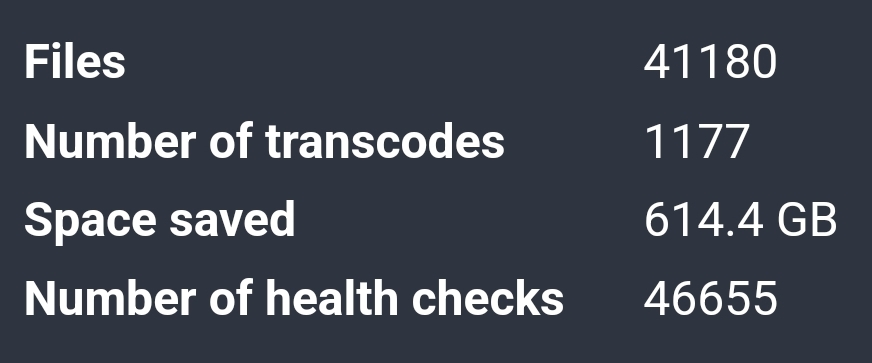this post was submitted on 27 Jul 2024
77 points (96.4% liked)
Piracy: ꜱᴀɪʟ ᴛʜᴇ ʜɪɢʜ ꜱᴇᴀꜱ
54577 readers
220 users here now
⚓ Dedicated to the discussion of digital piracy, including ethical problems and legal advancements.
Rules • Full Version
1. Posts must be related to the discussion of digital piracy
2. Don't request invites, trade, sell, or self-promote
3. Don't request or link to specific pirated titles, including DMs
4. Don't submit low-quality posts, be entitled, or harass others
Loot, Pillage, & Plunder
📜 c/Piracy Wiki (Community Edition):
💰 Please help cover server costs.
 |
 |
|---|---|
| Ko-fi | Liberapay |
founded 1 year ago
MODERATORS
you are viewing a single comment's thread
view the rest of the comments
view the rest of the comments

https://home.tdarr.io/
I used to use the built in convert options in Emby server, but recently switched to Tdarr to manage all my conversions. It's got far more control/configurablity to encode your files exactly how you'd like.
It can also 'health check' files by transcoding them, but not saving the output; checking for errors during that process to ensure the file can actually be played through successfully. With 41k+ files to manage, that made it much easier to find and replace the dozen or so broken files I had, before I found them by trying to play them.
Fore warning; this is a long and intensive process. Converting my entire library to HEVC using an RTX 2080 took me over 2 months non-stop. (not including health checks)
Awesome. Thanks for the info. I have been running Plex for years and started the switch to Jellyfin last year. Have a container running Emby but haven't put any work in to configuring or much yet.
Same situation with Tdarr. Threw together a quick container and got caught up in a billion other projects. I have an old 3600x / 1080ti system I'll likely use as a transcoding node. Just need to go over the docs and figure out how to setup input / output paths.
Configuring input/output paths are only really necessary when you have multiple systems that don't see the media at the same paths. Such as a Linux server and a Windows node working together.
Honestly, I just wish I'd have known about and set it up sooner:
Why dont you just redownload hevc on whats available and convert the rest?
I'm not sure redownloading would save any time.
I'd imagine there's a way to set that up with the *arrs but my personal path of less resistance is to just recode what I got rather than figure a process to redownlod out. There's is more resources than time at my disposal currently.
I assume youve seen trashs guides. But yea I get it. Im sure your aware reencoding can kill quality too. Many grab the blueray and then reencode that to hevc just depends what works